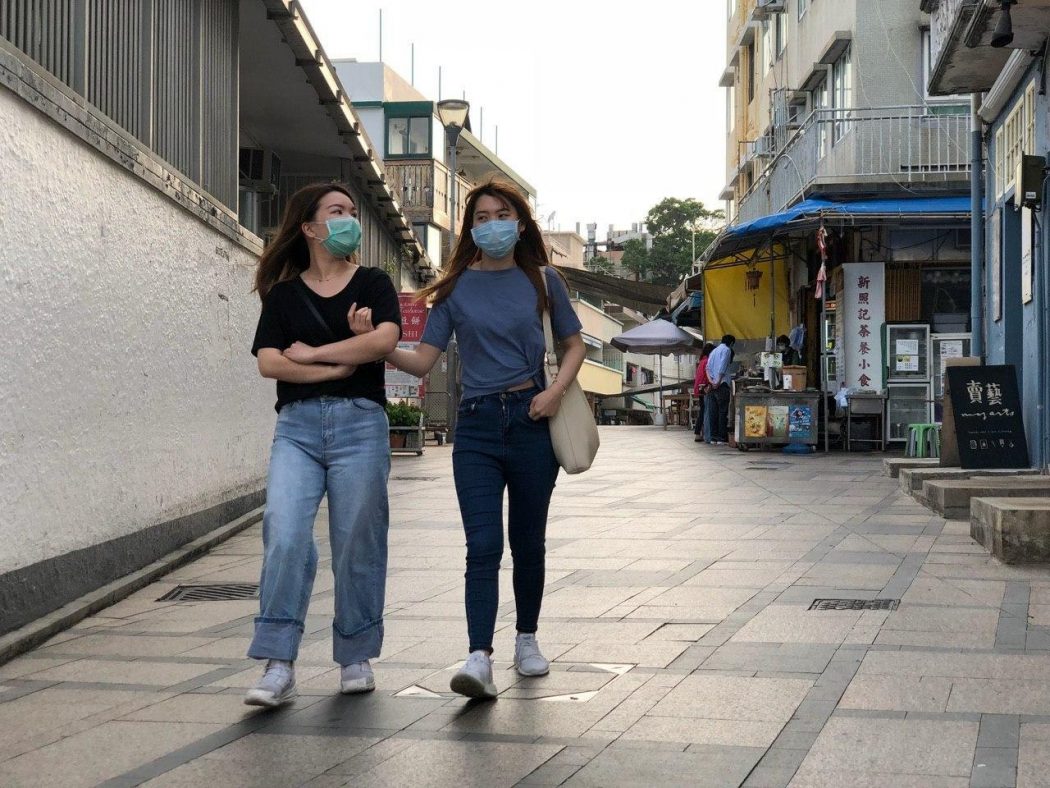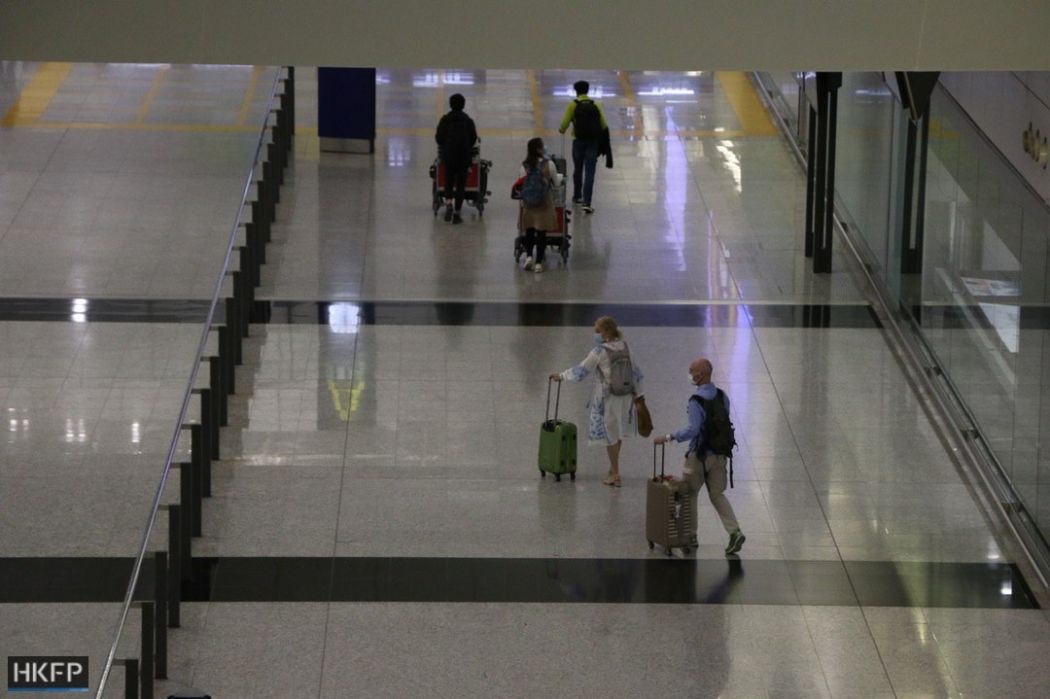By Sebastian Skov Andersen and Joyce Leung
Asians around the world worry about increasing racial discrimination and hate crime, yet
many protesters in Hong Kong insist on calling it the “Chinese coronavirus.”
As the coronavirus has spread throughout the world, many have disagreed on just how we should refer to it. Some people, including President of the United States Donald Trump, insist on calling it the “Chinese coronavirus” or the “Wuhan Virus”. Critics claim that attaching such a prefix to its name may trigger a surge of anti-Asian hate crime, and people all over the world have indeed shared their accounts of racist encounters that were clearly emboldened by the outbreak.

In spite of this, many members of the Hong Kong pro-democracy movement have continued to stand firm on speaking of it that way, mostly just shrugging off the criticism.
One protester, 20-year-old student Adrian Hui, told HKFP he finds it wholly appropriate to call it the Chinese Coronavirus because, as the sentiment goes, “it comes from China, so why should I not call it the Chinese coronavirus?”
The Chinese government has since condemned the use of terms like “Wuhan virus” in the country and recommend other countries do the same, or at least refrain from using them.
“If the CCP won’t allow us to say ‘Chinese Virus,’ we definitely need to use it more,” Hui added. “I have freedom of speech, and I don’t think it is racist or hurtful, it’s still just a name.”
When protesters use free speech as a justification for using charged terms, it also serves as a jab at the Chinese, because they do not share that freedom.

A common argument for calling it the “Chinese coronavirus” is that it serves as a reminder that the Chinese Communist Party (CCP) should be held accountable when the world eventually comes out on the other side of the crisis. Many protesters see the CCP as the primary culprit for why the outbreak was not contained before it spread to the rest of the world, and hence believe that China must pay for their carelessness.
And that strategy may have had some effect, yet mostly in spreading false narratives. In the United States, a recent poll carried out by the Pew Research Center, 23 percent of Americans believe the virus to be created intentionally in a laboratory in Wuhan, China — a theory which has been consensually disregarded by genetic detectives who study the origin of the virus.
According to Barry Sautman, a professor at the Hong Kong University of Science and Technology who has studied ethnic politics in China and Hong Kong, whether “Chinese virus” is used by officials in the White House or Hong Kongers on the ground, it is done for purely political reasons. Because many Hongkongers blame Chinese eating and hygienic habits for causing the outbreak, there is no question that “Chinese coronavirus” is loaded with xenophobic undertones, he said.
He also made the point that calling it the “Chinese coronavirus” is part of a greater mission by the pro-democracy movement to create a dichotomy between the mainlanders and Hong Kongers. Most protesters dream of an entirely independent Hong Kong, and saying “Chinese coronavirus” is but one tool out of many to achieve that goal.
“They certainly would agree that the existence of the virus is a fault not only of the Chinese government, but with Chinese people generally,” he said. “They want to show that China is guilty of all things that are adverse to the interest of people in Hong Kong. This virus has provided a big opportunity to do that and it is by no means just a criticism of the actions of the Chinese government.”
There are some disagreements within the pro-democracy movement about whether “Chinese coronavirus” or “Wuhan virus” is a more appropriate term. Some believe that attaching “Wuhan” as a prefix is not racist, but that using “Chinese” is, because Wuhan only refers to a geographic location and not a nationality.

Dr. Sautman doesn’t buy that distinction, seeing as the World Health Organization has presented them with less controversial terms:
“Of course the association of the virus with Wuhan would not itself be racist if not for the fact that they have been provided with an alternative,” he said. “If somebody chooses to use ‘Wuhan virus,’ they are doing so for political reasons.”
‘Coughing while Asian’
Many ordinary Asians around the world have already shared accounts of confrontations with strangers who’ve used the outbreak as justification to channel their racism against innocent people, who had nothing to do with the outbreak — and would never dream of eating bat soup.
One Chinese student who lives in the United Kingdom, 20-year-old Luvian Wang, said she had already noticed a significant increase in outspoken racist incidents now, when compared to just a few months ago. In her experience, looking Chinese now directly equates her with the coronavirus.
Before the outbreak, people would mostly just ignore her when she was out in public with her friends, she told Hong Kong Free Press. Now strangers send them hostile looks, speak poorly of the Chinese right in front of them, or exit train carriages when they enter. A few weeks back, a group of young men in a minibus rolled down their windows and chanted “corona! corona!” as they drove past her. Some have berated them for removing their face masks in public, implying that they are spreading the virus to the UK, she recalled.
“We didn’t want to make a fuss, so we just decided to walk away,” she said. “Then they started shouting at us, yelling ‘coronavirus, get out of the train!’ and ‘oh, we don’t want to get contracted’.”
“They think of us like we are a virus ourselves,” she continued. If the virus had originated in Hong Kong, would protesters also be designating it as the “Hong Kong coronavirus?” Wang asked.
Hui, the protester, didn’t agree with that narrative. Because there is already so much anti-Asian racism in the world, he said, calling it the “Chinese coronavirus” is only one drop in an ocean of thousands.
A plea to his fellows
Don Ma, a 23-year-old videographer and ardent supporter of the protests who lives in the UK, told Hong Kong Free Press he was unhappy with his companions in the pro-democracy movement.
“What we are protesting against isn’t the identity of the people, it is the authoritarianism of the government,” he said. “It’s about the system, not the people who live under the system.”
However, he disagreed with Dr. Sautman’s take on the motivations behind the terms. Instead of seeing it as an intentionally racist weapon, he attributed it to the ignorance of everyday Hong Kongers. “A lot of people don’t think about the consequences of using a name,” he said.

“Just from your appearance, people lay it on you as if you are from that area, even though there is a great possibility that you were born nowhere near there, or that you weren’t even born in the same country,” he continued. “I strongly believe that I can protest against the Chinese government whilst maintaining the stance that I don’t call it the ‘Chinese virus.'”
Speaking about the story of a Singaporean man who was assaulted in London because of his ethnicity, he said: “That could have been me. That could have easily been me.”
